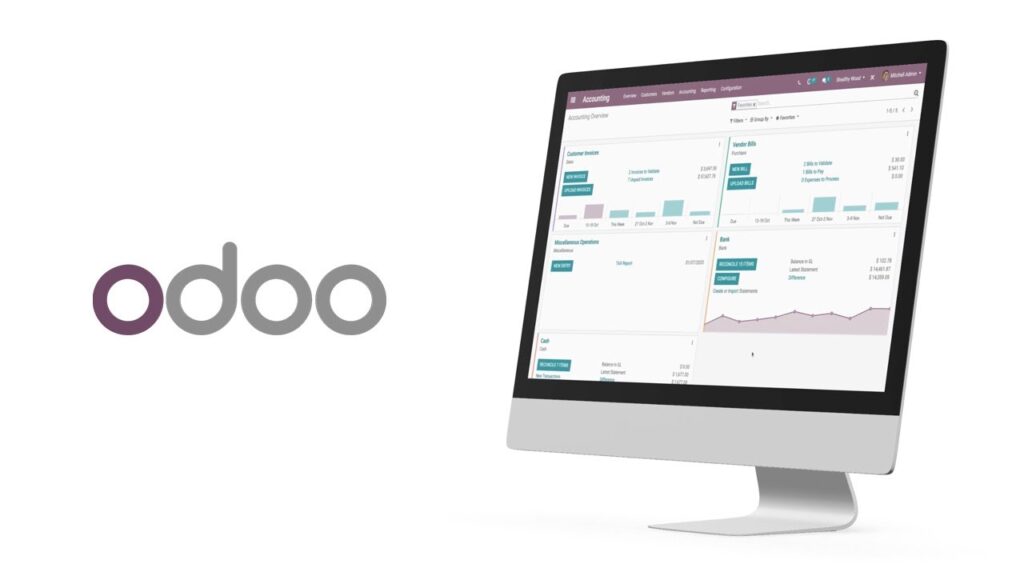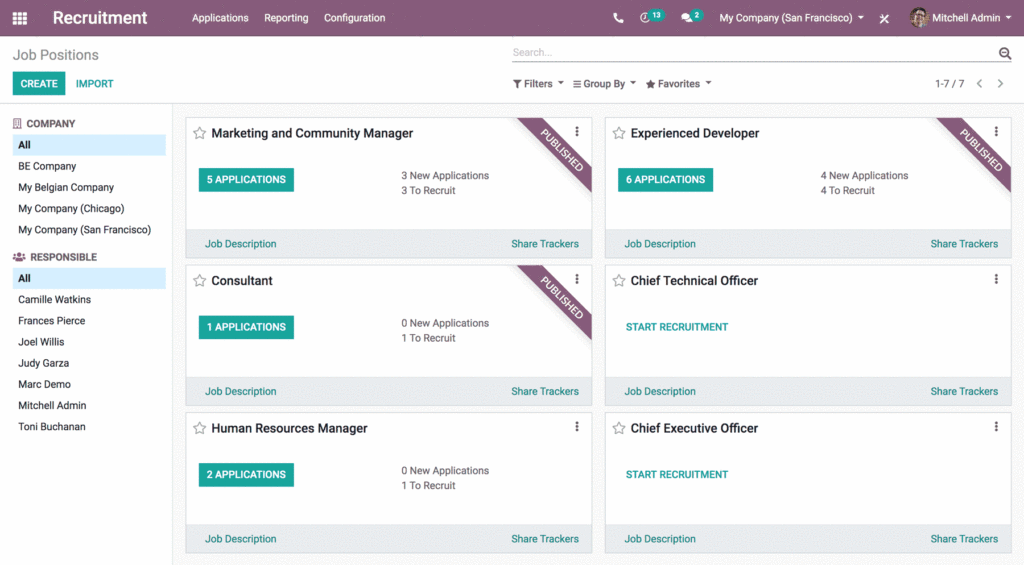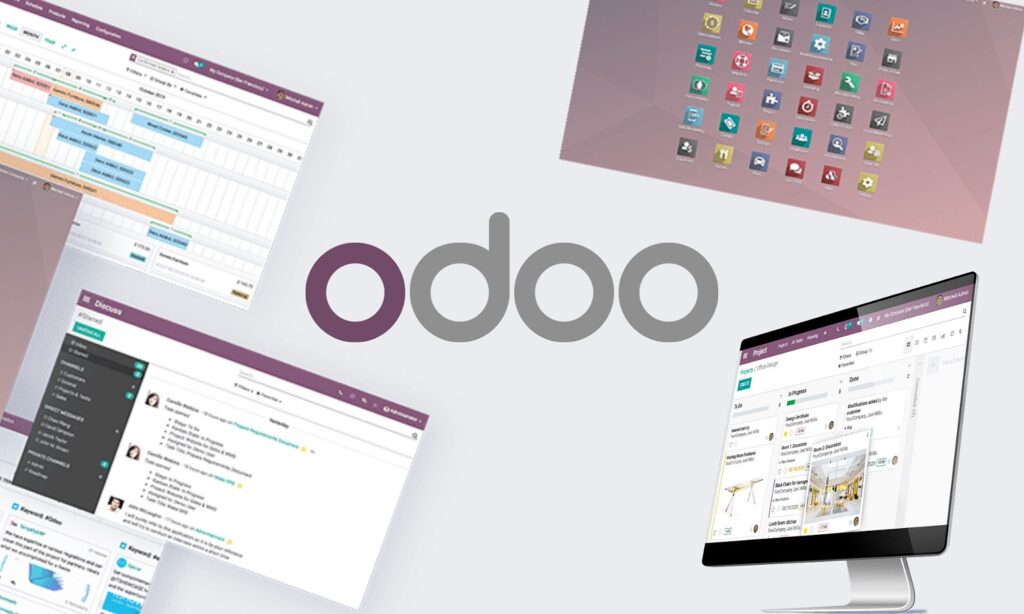There are numerous benefits to running your own service business, but being a one-person operation can be difficult at times.
Running and maintaining dependable and efficient operations can be difficult as a business grows. As a business owner, you need a solution that is not only trendy right now but can also scale and grow with your company for years to come.
Payroll is an important aspect of any business, and it can be especially difficult for small businesses due to limited resources and budget constraints. Manually maintaining a payroll for hundreds of employees is nearly impossible.
To optimize the payroll process, you should consider Odoo payroll.
What is Odoo Payroll?
Odoo Payroll is a comprehensive and efficient solution designed specifically for the needs of small businesses, assisting them to remain efficient while thoroughly and effectively managing payroll.
It is used to process work entries and generate payslips for employees, which include both regular and commission pay. Payroll integrates with other Odoo apps like Employees, Timesheets, Time Off, and Attendances.
The Payroll app ensures that no issues or conflicts arise when validating work entries, handles country-specific localizations to ensure that payslips adhere to local rules and taxes, and allows for salary assignments. Payroll configuration is critical for ensuring accurate and timely payslip processing.
Features of Odoo Payroll
01). User Friendly
Odoo payroll is simple to use. It is easily customizable to meet the unique needs of each business. As a result, it is a valuable tool for businesses of all sizes.
02). Employee Records Management
Odoo Payroll enables small businesses to keep detailed records on all of their employees, including personal information, employment history, and salary information.
03). Salaries Calculated Automatically:
Odoo can calculate salaries automatically based on employee contracts, hours worked, and other variables. This can save HR professionals a lot of time and effort.
04). Time Tracking Integration
The integration with Odoo’s time tracking module enables businesses to track employee timesheets accurately, which can help ensure that employees are paid correctly for their work.
05). Integrated benefits management
Odoo can assist businesses in managing employee benefits such as health insurance, retirement plans, and paid time off. This can assist businesses in saving money on administrative expenses.
06). Tax Management:
Odoo Payroll calculates and deducts taxes, ensuring accurate and timely payments to tax authorities.
Benefits of Odoo payroll
#1. Cost-Effective Solution
Odoo Payroll is a low-cost solution that eliminates the need for expensive third-party payroll services. By managing payroll in-house with Odoo Payroll, small businesses can save money on payroll processing and cut administrative costs.
#2. Compliance with Tax Regulations
Every business must comply with tax regulations, and failure to do so can result in penalties and legal issues. Odoo Payroll adheres to the most recent tax regulations, ensuring accurate tax calculations and timely tax filings for small businesses.
#3. Improved employee experience
Odoo can help improve the employee experience by providing employees with a single, simple system for viewing pay stubs, tracking timesheets, and managing benefits.
#4. Enhanced Efficiency:
Many manual payroll tasks, such as calculating salaries, tracking timesheets, and managing benefits, can be automated using Odoo. This allows HR managers to concentrate on more strategic tasks.
#5. Simplified payroll processing
One of the most significant advantages of Odoo Payroll is its user-friendly interface and simplified payroll processing. The software automates payroll tasks such as salary calculations, tax deductions, and pay stub generation. This automation streamlines the entire payroll process, saving time and decreasing the possibility of errors.
Odoo Payroll Integration in Your Business
Implementing Odoo Payroll in a business is a simple process that includes the following steps:
a). Data Migration
Transfer existing employee and payroll data to Odoo Payroll.
b). Needs Assessment
Determine the modules and features required in Odoo Payroll by assessing your small business’s specific payroll requirements.
c). Training
Teach HR personnel and payroll administrators how to use Odoo Payroll effectively.
d). Customization
Odoo Payroll can be customized to meet your company’s specific payroll policies and requirements.
Payroll alternatives of the ODOO payroll
ODOO payroll is one of the best payroll solutions for your business, but it is not the best choice for all businesses. The alternatives best payroll solutions that you can choose for your business based on features and functionality are listed below.
1). ADP Workforce Now
This is an online HR software for midsize businesses. In a single dashboard, this platform collects and automates your company’s HR processes. Benefits management, payroll, talent management, and time and attendance are among the most important features.
2). UKG Software
This is one of the most well-known providers of cloud-based HCM solutions that help businesses simplify payroll computations, accelerate talent acquisition, and manage strategic talent on a global scale.
3). Paycom
Paycom is one of the few companies that provides a complete HR solution in a single database. It enables you to pay your employees, comply with regulations, train your workforce, and much more. Payroll automation is intended to accelerate your process.
What to Look For in Payroll Software
When looking for a good compliance software solution, consider the following aspects and features:
I). Accuracy
A good payroll system should be able to integrate various employees’ working hours.
After installing a good system, you should be able to record the various working hours of your employees while minimizing record errors with an automated system.
II). Streamlining
A good, automated payroll system can help eliminate busy work by streamlining the entire process of record-keeping, scheduling, and payment.
With advanced guidance, effective payroll systems of all types can be standardized and streamlined.
III). Record – Keeping
A good payroll system can be used to keep detailed track of information and records, which can then be stored in a main database online, on-site, in a recordkeeping facility, or the cloud.
This is a useful feature to have in a payroll system because it allows you to keep track of how much you pay for overtime and how many employees participate in your company’s retirement plan.
IV). Notifications
It sends you reminders, alerts, and push notifications, as well as allows you to notify your employees if they need to perform actions, such as reviewing their timesheets.
V). Deductions
A good payroll system should be able to be set up for more complex functions such as tax deductions and benefit purposes, in addition to simply recording work hours and pay.
It should be able to calculate each employee’s individual Medicare, Social Security, and benefit plans, among other things.
VI). Employee accessibility
Your employees should be able to access and review their personal payroll information.
VII). Support
It comes with good customer support to help you with any issues.
Conclusion
When compared to other payroll solutions, Odoo Payroll stands out as the ideal solution for small businesses due to its low cost, user-friendly interface, and streamlined payroll processing. Small businesses can achieve greater efficiency, tax compliance, and significant cost savings by integrating Odoo Payroll into their operations.
Related:






